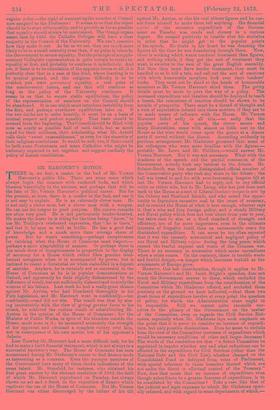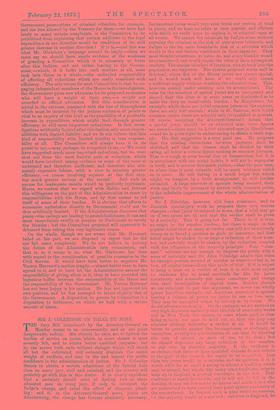MR. HARCOURT'S MOTION.
THERE is we fear, a canker in the bud of Mr. Vernon Harcourt'a public life. There are some roses which always begin the summer with cankered buds, and which blossom beautifully in the autumn, and perhaps that will be the fate of Mr. Vernon Harcourt's political career. But for the present, at least, there is a canker in the bud, and one it is not easy to explain. He is an extremely clever man. He is not only a clever man, but a clever man with a weapon. He can use his tongue to good purpose. His caustie remarks are often very good. He is not particularly tender-hearted. He makes the horse he is riding for the time being, "know," to use Mr. Trollope's celebrated expression, that "he is there," and feel it by spur as well as bridle. He has a good deal of knowledge, and a much more than average share of power. But he wants something,—perhaps receptiveness for catching what the House of Commons. most respect,— perhaps a mere adaptability of manner. Or perhaps there is too much show of bumptiousness in proportion to the display of accuracy for a House which rather likes genuine intel- lectual arrogance when it is accompanied by power, but is inclined to resent a dictatorial air when embedded in a deposit of mistake. Anyhow, he is certainly not as successful in the House of Commons as ha is in popular demonstrations at Oxford, and apparently he feels slightly disheartened by the difference of result, but not sufficiently disheartened to study the sources of his failure. Last week he had a really great chance against Mr. Ayrton, who had blundered thoroughly in his Park legislation, and Mr. Harcourt went in confidently,—too confidently,—and did not win. The result was that by aim- ing inaccurately with the view of giving greater force to his attack, he achieved the curious result of rehabilitating Mr. Apton in the opinion of the House of Commons ; for the Miaister of Public Works, in. spite of his blunders outside the House, made none in it ; he measured accurately the strength of his opponent and obtained a. complete victory over him, not in consequence of his own merits, but of his opponent's defects.
Last Tuesday Mr. Harcourt had a more difficult task, for he had to make a lucid financial statement, which is not always in a successful barrister's way. The House of Commons has been accustomed during Mr. Gladstone's career to find finance made as,interesting as a romance. Even the younger members of the Government have many of them shown indications of the same talent. Mr. Stansfeld, for instance, who obtained his first great success by the abstract resolution of 1862, the drift of which Mr. Harcourt reproduced on Tuesday, has always shown an art and a finish in the exposition of finance which captivate the ear of the House of Commons. But Mr. Vernon. Harcourt was either discouraged by the failure of his tilt against Mr. Ayrton, or else his soul abhors figures and he can- not force himself to make them tell anything. His financial mpose of the excessive expenditure of the Govern- ment on Tuesday was crude and clumsy in a curious degree. He seemed positively to tumble over his statistics in order that he might get to the popular points of his speech. No doubt in his heart he was damning the figures all the time he was floundering through them. Now, there is nothing which wants tenderer treatment than figures, and nothing which, if they get the sort of treatment they want, is sweeter to the ears of the great English assembly. But then they must have tender treatment, they must be handled so as to tell a tale, and call out the sort of emotions with which honourable members look over their bankers' books. They must not be shied at the heads of honourable, members as Mr. Vernon Harcourt shied them. The gritty details must be made to pave the way of a policy. The increased expenditure and taxation should be deployed to teach a lesson, the remissions of taxation should be shown to be heralds of prosperity. There mast be a thread of thought and a vein of expectation infused into these matters, if they are to be made means of influence with the House. Mr. Vernon Harcourt failed sadly in all this,—so sadly that the popular parts of his speech, the clever sneers and sharp illustrations, came with almost as little zest on the House as the wine would come upon the guests at a dinner party if served without the dinner. According evidently to previous arrangement, Mr. Gladstone promised that some of his colleagues who were more familiar with the figures,— probably Mr. Lowe and Mr. Childers,—would answer Mr. Vernon Harcourt. But it was not necessary. What with the deadness of the speech and the partial concession of the Government, nobody took any interest in the debate. Mr. Sclater-Booth was the most distinguished official member of the Conservative party who took any share in the debate ; the ball was tossed to and fro with ever-increasing languor till at last Mr. Vernon Harcourt had to reply, not to any official critic on either side, but to Mr. Laing, who has just been sent back to the House as a sort of Liberal laudator temporis acti by the Orkney and Shetland Islands, and who seized the oppor- tunity to depreciate excessive zeal in the cause of economy, and to remind the House of what is true enough, whoever says it, that a wise and firm foreign policy, and a steady Military and Naval policy which does not veer about from year to year, but takes care to aim at a fixed standard of strength and efficiency, are of far more importance, even in the ultimate interests of frugality itself, than an unreasonable crave for diminished expenditure. It can never be too often repeated that it was the insanely economical and negligent policy of our Naval and Military regime during the long peace, which caused the fearful expense and waste of the Crimean war. There is no economy in economies which mean unreadiness when a crisis comes. On the contrary, there is terrible waste and fearful danger,—a danger which increases tenfold as the armaments of Europe grow.
However, this last consideration, though it applies to Mr. Vernon Harcourt's and Mr. Jacob Bright's speeches, does not touch the Government answer to them, which excluded the Naval and Military expenditure from the consideration of the Committee which Mr. Gladstone offered, and excluded them precisely on the ground we have indioated,—that these two great items of expenditure involve at every point the question of policy, for which the Administration alone ought to be responsible. Still we cannot quite reconcile our- selves to the pliancy of the Government on the matter of the Committee, even as regards the Civil Service Esti- mates, especially when Mr. Gladstone lays such emphasis on the point that it is never to consider an increase of expendi- ture, but only possible diminutions. Does he mean to exclude from the view of the Committee increases of expenditure which would be necessary conditions of other and larger decreases The words of the resolution are that " a Select Committee be appointed to inquire whether any and what reductions can be effected in the expenditure for Civil Services (other than the National Debt and the Civil List), whether charged on the Consolidated Fund or defrayed from votes of Parliament, with special reference to those branches thereof which are not under the direct or effectual control of the Treasury." Now, does that mean that no increase of expenditure, even though subordinate to a greater decrease of expenditure, is to be considered by the Committee ? Take a case like that of the judicial and legal expenses to which Mr. Gladstone speci- ally referred, and with regard to some departments of which,— Government prosecutions of criminal offenders, for example, and the fees allowed by the Treasury for them,—we have had lately so many serious complaints, is the Committee to be prohibited from explaining that certain additions to the legal expenditure in one direction would be conditions of its still greater decrease in another direction ? If it is,—and this was what Mr. Gladstone's language seemed to imply,—then we must say we should have ample evidence of the weakness of granting a Committee which it is necessary to fetter after this fashion, and not rather leaving to the Govern- ment,—which, if it looks into such matters at all, must look into them as a whole,—the undivided responsibility of effecting all reductions which are really consistent with efficiency. The only excuse for such Committees is that by en- gaging independent members of the House in the investigation, the Government gains new advocates for its proposed economies who will have a weight of their own,—a weight not
accorded to official advocates. But this consideration is trivial in the extreme, compared with the loss of thoroughness which must be incurred by the jealous exclusion of points so vital to an inquiry of this kind as the possibility of a profitable increase in expenditure which might lead, through greater efficiency, to still more important reductions. In fact, inves- tigations artificially limited after this fashion only mean respon- sibilities with limited liability, and we do not believe that this kind of responsibility with limited liability is true responsi- bility at all. The Committee will always have it in its power to say,—may, perhaps, be compelled to say,—'We could have suggested much more important reductions, but we were shut out from the most fruitful path of reduction, which would have involved taking evidence on some of the cases of underpaid and therefore inefficient, and therefore also ulti- mately expensive labour, with a view to securing greater efficiency,---a course involving expense at the first step, but much greater savings at the second.' And such an excuse for inadequate results would be perfectly legitimate. Hence, we confess that we regard with dislike and distrust this willingness on the part of the Administration to share its responsibilities with the House, and by that means to rid itself of some of their burden. It is obvious that efforts to economise undertaken directly by Government could not be thus artificially limited. If the Administration discovers that penny-wise savings are leading to pound-foolishness, it can and must immediately rectify or propose to Parliament to rectify the blunder ; but the Committee proposed will apparently bo debarred from taking this very legitimate oourse.
On the whole, though we are aware that Mr. Harcourt failed on his part, we are disposed to regret that he did not fail more completely. We do not believe in putting the duties of the Administration into commission, and that is, as it seems to us, what Mr. Gladstone has done with regard to the consideration of possible economies in the Civil Service. It would have been better to negative Mr. Vernon Harcourt's motion simply,—almost better even to have agreed to it, and to have let the Administration assume the responsibility of giving effect to it, than to have provided this ingenious buffer between the responsibility of the House and the responsibility of the Government. Mr. Vernon Harcourt has not been happy in his motion. He has not improved his own position, and he has managed to injure slightly that of the Government. A disposition to govern by Committee is a disposition to feebleness, on which we look with a certain amount of alarm.



































 Previous page
Previous page